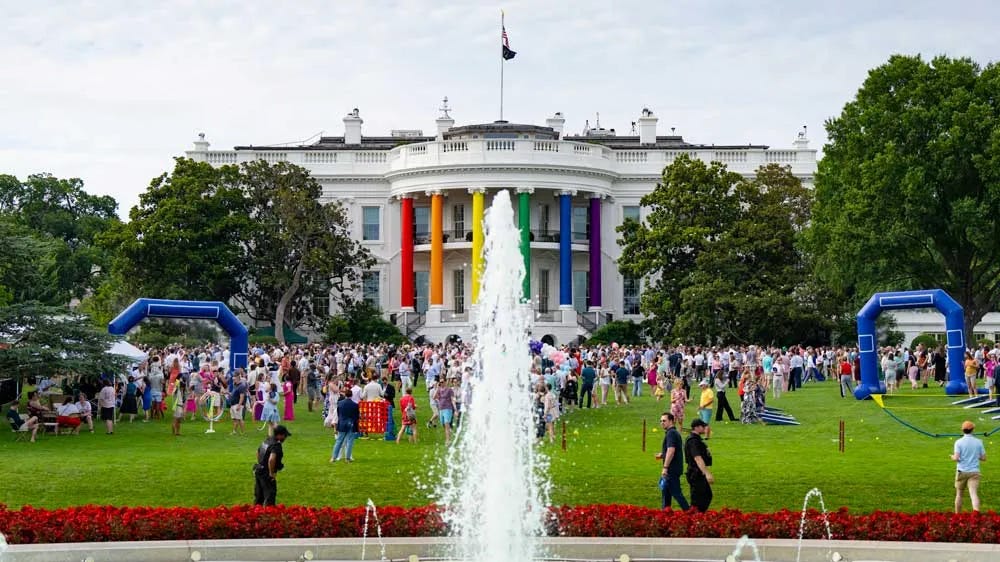Pentagon Upgrades Discharges of Hundreds of LGBTQ Veterans
The Move Benefits Veterans Thrown Out of the Military during 'Don't Ask, Don't Tell' but Leaves Untold Number of Vets from 1980s and Earlier Without Relief
This story was originally published by The War Horse, a nonprofit newsroom educating the public on the military.

Hundreds of gay and lesbian veterans will soon receive honorable discharges, marking a major step forward in the Pentagon’s promise to address decades of discrimination against LGBTQ service members.
Secretary of Defense Lloyd Austin announced Tuesday that the Defense Department would be upgrading the discharges of roughly 820 veterans who were kicked out of the military solely because of their sexual orientation. The move will clear their records and unlock access to veterans benefits, such as healthcare.
“We will continue to honor the service and the sacrifice of all our troops—including the brave Americans who raised their hands to serve but were turned away because of whom they love,” Austin said in a statement.
The announcement comes a little more than a year after the Pentagon agreed to proactively review records of service members who were separated during the “don’t ask, don’t tell” era—1994 to 2011. At the time, advocates cheered the move after years of urging the Pentagon to rectify past anti-gay policies that upended the lives of gay and lesbian service members.
“Many lost the pride and identity that comes with military service, as well as the career opportunities of having served a full enlistment with an honorable discharge,” says Mo Siedor, legal director at Swords to Plowshares, a San Francisco Bay Area nonprofit dedicated to assisting low-income and homeless veterans. “The DOD is acknowledging that loss and correcting some of the injustice inflicted by ‘don’t ask, don’t tell.’”
Austin’s announcement also comes 3 ½ months after President Biden announced he would be pardoning LGBTQ veterans who had been court-martialed because of their sexual orientation. Advocates celebrated both developments, but they also have been quick to discover that thousands of other LGBTQ veterans appear to be left behind.
The War Horse has reported that, as of late September, only eight veterans have applied for Biden’s pardons, despite White House officials saying thousands of veterans would benefit. Critics complained the confines of the pardon are too narrow and the application process is daunting.
On Tuesday, Siedor and other advocates pointed out limitations to the Pentagon’s reviews, which only focused on veterans who served for more than six months in the “don’t ask, don’t tell” era from 1993-2011.
“The military’s announcement is misleading and falsely suggests that it has now fixed all the improper discharges made under that policy. It hasn’t,” says Renée Burbank, director of litigation at the National Veterans Legal Services Program, a nonprofit that represents veterans.
She says the “proactive review” of 13,500 records “did nothing” for nearly 4,500 “don’t ask, don’t tell” era veterans who were outed as gay and kicked out before they could complete six months of service, the bar needed to access veterans benefits like healthcare and the GI bill.
The Pentagon did not consider those individuals for an honorable discharge upgrade, and that group will stick with what’s known as an “uncharacterized discharge.”
The Pentagon’s review also did not include records before 1993, the year that the military introduced “don’t ask, don’t tell,” a policy that allowed gay people to serve, as long as they remained in the closet.
It’s estimated that between the end of World War II and the repeal of “don’t ask, don’t tell,” roughly 114,000 veterans were kicked out because of their sexual orientation.
A Pentagon spokeswoman didn’t say why the department limited its review to the “don’t ask, don’t tell” era. She said the department encouraged any veteran who was the victim of the military’s anti-gay discrimination before that era to apply for a discharge upgrade through the military review boards.
But The War Horse has reported on situations like those of Mona McGuire, a soldier who in the late 1980s was kicked out of the Army after someone in her unit outed her as a lesbian. Though her sexual orientation was the basis for her other than honorable discharge, a military review board last year denied her a discharge upgrade, ruling that she had admitted guilt when she was interrogated as a 20-year-old.
Michael Wishnie, a professor at Yale Law School and veteran law expert, says stories like McGuire’s are the reason the Pentagon should continue its search for veterans wronged by the military’s past discrimination.
“The Pentagon should now do the same for the hundreds of thousands of service members wrongfully separated in the decades before enactment of “don’t ask, don’t tell,’” he said.
In Tuesday’s announcement, Austin touted “President Biden’s leadership” and the administration’s “extraordinary steps to redress the harms done by “don’t ask, don’t tell” and other policies on these former Service members.”
But Peter Perkowski, the legal and policy director of Minority Veterans of America, says the military has yet to fully reckon with its 60 years of anti-gay policy.
For instance, the pardons and the Pentagon’s recent review of records did not include an unknown number of veterans who were targeted for their sexual orientation but kicked out of the military for reasons such as misconduct or conduct unbecoming.
“If you exclude misconduct, you’re excluding a large portion,” he says, calling the recent efforts “well-meaning measures,” but also, “half-measures” that do not address widespread harm spanning decades. “You’re going to get a couple hundred here, a couple hundred there, and you’re gonna keep wondering why these don’t work.”
If objective, nonpartisan, rigorous, LGBTQ-focused journalism is important to you, please consider making a tax-deductible donation through our fiscal sponsor, Resource Impact, by clicking this button:


